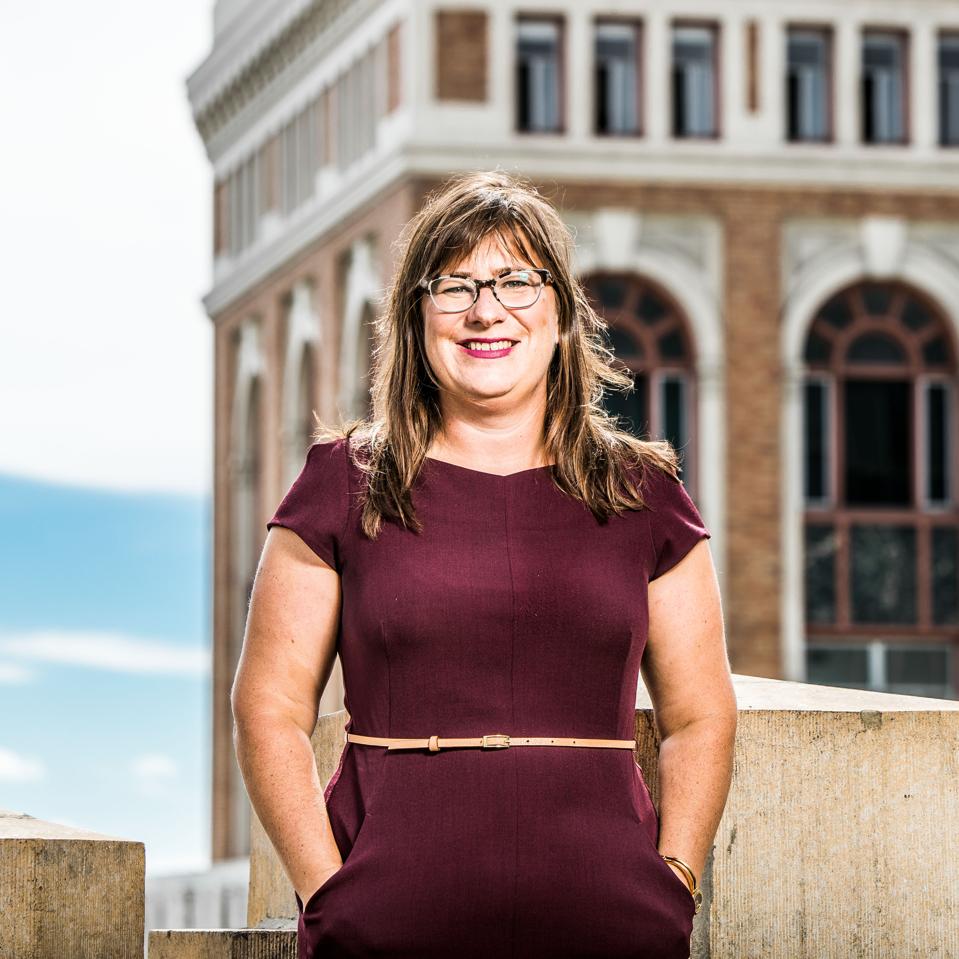Pandemic Shopping, Virtual Whiteboards And An Ex-Poker Pro: These Cloud 100 Companies Stand Out

Cloud 100 newcomer LaunchDarkly's CEO Edith Harbaugh is out to kill "push and pray" moments in software launches. "We make releases a little boring," she says.
Eric MilletteThe companies of the Forbes Cloud 100 list represent the best private cloud businesses that the tech sector has to offer, their tools used by millions and powering businesses in every category.
With 87 companies valued at $1 billion or more and many far exceeding that, it’s a powerful group. Their leaders represent some of entrepreneurship’s best. Among the Cloud 100 for 2020, these eight companies and their CEOs stand out. Ranging from Australia to Oakland, these ex-poker playing, ultra-marathon-running founders have answers in a challenging time — and the success to match.
No. 5 Databricks

Databricks CEO Ali Ghodsi.
Michel EdensDatabricks CEO Ali Ghodsi says three long-term bets have paid off at his database company valued at $6.2 billion: commitments to cloud computing, open-source software and the growing need for machine learning and AI. Ghodsi, a University of California, Berkeley professor like his cofounders, says all three have paid off even more during the Covid-19 pandemic. “Everybody’s thinking, we should maybe automate some stuff, we should maybe optimize costs and be more efficient in how we run our businesses,” Ghodsi says. With Databricks, he argues, companies can run cost-saving and efficiency-boosting algorithms cheaper and faster. Now, as Databricks’ revenue run rate reached $350 million in the third quarter of 2020, Ghodsi has a new zany bet: hiring aggressively in a pandemic for international expansion. “People said we were crazy,” says Ghodsi. “And I say back that if you’re not starting out with something like that, if what you’re doing is semi-obvious, the big guys will eat you up alive.” — Alex Konrad
No. 15 Checkout.com

Checkout.com CEO Guillaume Pousaz.
Kieran Kesner for EndeavorAs every aspect of life has moved further online during the global pandemic, Checkout.com has proven invaluable in one especially internet-dependent category: ecommerce. The London-based payment solutions provider was already one of Europe’s largest fintech startups when it raised a $230 million Series B funding round in June that valued it at $5.5 billion. “While the move to online commerce was already in motion, the Covid-19 crisis has further accelerated this societal shift,” says founder and CEO Guillaume Pousaz. With online transactions up 250% for the year, Checkout.com, the highest-ranked newcomer on this year’s Cloud 100 list, has hired 300 new employees since Covid-19 lockdowns began to keep up with demand. — Monica Melton
No. 29 Figma

Figma CEO Dylan Field.
FigmaAlready built to help make remote collaboration a breeze, count design and prototyping tool Figma among the tools that’s found its mission renewed during the global pandemic. “The use cases for Figma have multiplied and we've seen people from all sorts of backgrounds express themselves using our software,” says Figma’s 29-year-old CEO, Dylan Field. “You can't be creative and afraid at the same time, and it brings me joy to know that we are helping people focus on ideas rather than fears.” Started by Field and cofounder Evan Wallace after Field had dropped out of college to become a Thiel Fellow, Figma now boasts clients including Dropbox, Spotify and Microsoft and raised fresh funding at a $2 billion valuation in April 2020. — Elisabeth Brier
No. 46 Guild Education

Guild Education CEO Rachel Carlson.
Stephen Cardinale 2020In times of hardship, companies must train employees to face new challenges. Seven months into a global pandemic, Guild Education CEO Rachel Carlson finds her software that connects workers to online education courses to be in high demand. An idea that started while Carlson was an MBA candidate at Stanford University in 2015, Guild Education reached a $1 billion valuation last year and sent more than 400,000 workers at companies like Walmart and Chipotle through online education courses by the start of 2020. Business has remained steady since. Says Carlson: "Because students are going back to school, we've been able to weather the storm." — David Jeans
No. 57 Miro

Miro CEO Andrey Khusid.
MiroSome of the world’s best ideas have been drawn on whiteboards in boardrooms and classrooms. But just as the whiteboard replaced the blackboard as tool of choice, Miro has raised $75 million to replace both with a digital collaboration alternative. And as workforces remain out of office, Miro has seen demand skyrocket. The San Francisco-based startup increased its customer base from 14,800 paying users to 40,000 since the start of March. After a fresh funding round in April, Miro is now on track to employ 650 people by year’s end, up from 250 at its start. "The market didn't recognize this as a big category," says cofounder and CEO Andrey Khusid. "Then this year, everything shifted." — David Jeans
No. 64 Blend

Blend CEO Nima Ghamsari.
BlendTo pay for his room and board at Stanford University, Blend cofounder and CEO Nima Ghamsari turned to online poker. Within four months, he had made six figures in profits, though he stopped playing in 2011 when the FBI shut down major online poker websites in the U.S. Still, Ghamsari applies the lessons he learned to his startup Blend, which works with financial institutions such as Wells Fargo to streamline their loan process.
The poker experience came in handy when Ghamsari’s colleagues were hesitant to launch a home insurance product in 2018. “Our team was trying to get all the data before we even tried it,” Ghamsari says. “I remember I said, ‘No, let’s just do it.’” The decision panned out for the startup, which has since expanded to auto loans and deposit account openings on its way to a $1.7 billion valuation after an August funding round. The lesson? Just as you can’t see your opponent’s hand in poker, don’t rely on having complete information to make decisions in business. — Kenrick Cai
No. 80 Culture Amp

Culture Amp CEO Didier Elzinga.
PRUE AJA PHOTOGRAPHYCulture Amp CEO Didier Elzinga helped Superman and Harry Potter refine their superpowers as the head of a special effects company in a past life.A decade later, the cofounder has raised more than $158 million for his startup that’s working on a problem Hollywood can appreciate: how to bring people together. Melbourne, Australia-based Culture Amp works with 3,000 customers to help them keep their employees engaged and happy — at least as much as possible in a pandemic. “Work has become how we, for better or worse, think about our journey in life, and so it better be meaningful,” Elzinga says. Earlier this year, Culture Amp conducted an anti-racism deep dive into its own culture to help. One result: the introduction of a 38% discount for Black and Indigenous-owned businesses as a way to offset systemic racial wage gaps. — Kenrick Cai
No. 100 LaunchDarkly

LaunchDarkly CEO Edith Harbaugh.
Eric MilletteWhen LaunchDarkly CEO Edith Harbaugh worked in engineering roles prior to launching her startup in 2014, releasing new features was a stressful process. “You always worried about what was going to going wrong. You dreaded the TechCrunch or Forbes article about using the release and everything broke,” she says. Today, her Oakland-based startup has proven popular with 1,500 customers like car buying site TrueCar by doing away with those “push and pray” moments. LaunchDarkly now helps companies push features for everything from mobile banking to restaurant delivery – 6 trillion each day. With just 10 minutes of set-up by a developer, non-technical coworkers can use the startup’s tools to turn off buggy features from home, no code required. “We make releases a little boring,” says Harbaugh, an ultra-marathoner in her spare time. — Alex Konrad
from Online Poker
Post a Comment